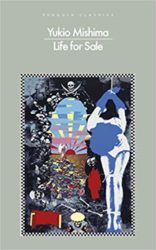Theater Interview: Director Benny Sato Ambush’s Japanese Connection
By Robert Israel
The highlights of this year’s gathering will be productions of newly discovered or rediscovered works by both Tennessee Williams and Yukio Mishima.
The late Japanese writer Yukio Mishima shares the bill with American playwright Tennessee Williams as local, national, and international troupes present their works at the 14th Provincetown Tennessee Williams Theater Festival, opening September 26. Mishima’s plays on view will include The Black Lizard, The Lady Aoi, Busu, and The Lighthouse.
Honoring one’s ancestors is a current that flows throughout Japanese culture. For Benny Sato Ambush, who has Japanese ancestry, he will draw on this tradition when he directs Yukio Mishima’s “The Lighthouse.” A one-act written in 1949, the play is receiving its English-language premiere at the PTWTF. Produced by Marisa Carpio, The Lighthouse will feature an all-Japanese cast.

Director Benny Sato Ambush. Photo: Emerson Stage.
The highlights of this year’s gathering will be productions of newly discovered or rediscovered works by both Williams and Mishima (the two writers met in New York in 1957 and became friends). An unproduced play from Williams’s archives, The Lady from the Village of Falling Flowers, will be coupled with a world premiere staging of Mishima’s script Busu.
In the course of his stage career, Ambush has blended his Japanese ancestry with academic theater training. He studied the Stanislavsky method – and other theater theorists — and says these mentors fostered in him the belief that actors must convey the emotional depth of characters they portray.
“Mishima’s play is written in the genre of modern realism, the same genre that Tennessee Williams used,” Ambush explains. “His work reminded me of Anton Chekhov dramas and short stories. Chekhov wrote about what lies underneath, about the buried feelings of his characters, and he explored how an actor and director communicate emotions to audiences without words.”
Ambush emphasizes that words alone can never fully articulate characters’ emotions.
“Words can lie, so actors must tap into the energy trapped or hidden underneath the words – which may be true or false – to get at the stuff that’s roiling beneath. Actors must show emotionally what is not being spoken,” Ambush observes.
Mishima (1925-1970) came of age after World War II. At that time, the occupying Americans, fearing Japanese nationalism might flare up again and inspire aggression, imposed social reforms on their conquests. Under this American edict (enforced between 1945-1952), Japanese citizens were prohibited from publishing personal, confessional narratives. Mishima rejected the American edict. Near the end of his life he embraced militaristic nationalism, practicing it clandestinely by founding Tatenokai — his own, all-male, private militia. Early on, he wrote a piece that paid homage to kabuki, a highly stylized seventeenth century performance art that features only male actors. Attending a kabuki production in Tokyo’s Ginza district some years ago, I understand Mishima’s attraction: kabuki actors move with military precision, revealing (and concealing) their characters’ emotions. Kabuki actors are masters of silence, adept at manipulating its power. Without moving their lips, they emit eerie sounds drawn from their diaphragms. Unsuspecting audience members suddenly hear high-pitched keening, reverberating throughout the auditorium, sounds coming out of nowhere.

Japanese author, and cult figure, Yukio Mishima.
Mishima’s The Lighthouse employs similar unsettling effects. It is set in a hotel room on the Japanese island resort of Oshima, 300 miles south of Tokyo. Like Williams, Mishima uses drama to unlock the longing buried deep inside his characters, exploring how passions, long suppressed, can become all consuming, much like the unseen keening performed by kabuki players.
“The play is based on the Phaedra myth,” Ambush says, “and tells about forbidden love. The son in the play is in love with his stepmother. It is a mutual attraction, but it isn’t fully expressed. My challenge as a director is to communicate the longings of the heart, to show how complex these emotions are, to reveal their depths, to suggest how these emotions engender anxiety found in the characters.”
Mishima’s one-act play, Ambush says, identifies the “tidal turn of adulthood.”
“One character’s sexuality emerges fully on a warm spring night while on a holiday, within sight of a lighthouse, as sleepless anxiety finally finds a way to be expressed,” Ambush insists.
Ambush is no stranger to tapping into his Japanese ancestry for the stage. He directed the 2017 Lyric Stage of Boston production of Jeanne Sakata’s play, Hold These Truths, which told of the forced interment of Japanese-Americans in camps in the Western United States during World War II. The racial and ethnic prejudices exposed in Sakata’s play, Ambush asserts, reflected the treatment his family endured on the east coast.
“My Japanese grandfather married my black grandmother, Grace Virginia Sato,” Ambush syas, “and they had five children, my mother among them. During World War II, my grandmother lost the right to vote because she had married a Japanese man, even though he had died by then. Talk about ironies! Can you guess what her job was? She worked at Cambridge City Hall registering people to vote. When I think about my family’s experience during this time I reflect what it might have been had we been living on the west coast instead of in the Boston area.”
While Ambush never met his Japanese grandfather, he confesses that he feels his ancestor’s presence in his work.
“I believe there is something that is operating in me that is Japanese,” Ambush claims. “I believe it is a racial memory, passed onto me. It wound up anchored in my DNA. You could call it a ‘feel thing,’ something that can’t be defined. It is rooted in me. I fully expect to use it in this production.”

Editor’s Note: Recently Life for Sale, a 1968 novel by Yukio Mishima, first published in Japanese Playboy, was translated (for the first time) into English (Penguin Classics). According to a review in the Spectator, “this existential crime novel has an arresting premise and Mishima plays it for all it’s worth. Quotidian reality has no place here. You know this is going to be fun when, after his suicide attempt almost on the first page, Hanio [the young protagonist] sees the days that now lie ahead as “a row of dead frogs with their white bellies exposed.” A critique in the New Statesman found that “a sense of meaninglessness is the central theme in Mishima’s newly translated Life For Sale, where the absurdity of life is conveyed through the tropes of pulp fiction and manga comics. Little known in the West to date, the novel inspired a popular television series in Japan. Throughout the book, the tone is unheroic and self-mocking. ‘Now that Hanio had failed to commit suicide, a wonderfully free and empty world opened up before him. Why the anti-hero wanted to kill himself is never clear to him.'” Sounds interesting … Also, New Directions has published, for the first time in English, Star, a 1961 Mishima novella. According to the Los Angles Review of Books, “it is a relatively minor work in the pantheon of Mishima’s greatness, [but] it is an exquisite contemplation of existence and death, and Mishima’s prose is extremely powerful and the translation finely executed.” — Bill Marx
Robert Israel writes about theater, travel, and the arts, and is a former member of Independent Reviewers of New England (IRNE). He can be reached at risrael_97@yahoo.com.
Tagged: Benny Sato Ambush, Provincetown Tennessee Williams Theater Festival, The Lighthouse
